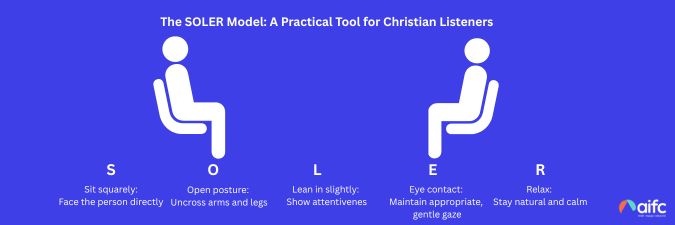When Jesus said in Luke 6:27, “But to you who are willing to listen,” He wasn’t just asking people to hear; He was extending an invitation to receive His words with open, receptive hearts. This invitation remains at the core of our calling in Christian coaching and counselling.
Listening is not passive. It’s an active, sacred practice that honours the person before us as someone created in God’s image. For those called to Christian counselling or coaching, the ability to truly listen is essential. It builds trust, reflects Christ’s love, and facilitates healing and transformation.
Why Listening Is Foundational in Christian Coaching and Counselling
Before we explore specific tools and techniques, let’s take a moment to reflect on the deeper importance of listening — not just in client sessions, but in our daily lives, families, workplaces, and communities.
✨ Pause and Reflect:
-
What does it feel like when someone truly listens to you?
-
And how does it feel when you’re not heard?
-
How would our world change if more people developed the ability to listen well?
-
Is listening simply hearing, or does it involve curiosity and asking powerful questions? (For insight, explore the kinds of questions Jesus asked in the Gospels.)
Guarding and Renovating the Heart: The Inner Work of a Christian Coach or Counsellor
Proverbs 4:23 says, “Above all else, guard your heart, for everything you do flows from it.”
As Christian coaches and counsellors — or those preparing to become one — this verse reminds us that our effectiveness is rooted in the condition of our own hearts.
In his book Renovation of the Heart, Dallas Willard teaches that transformation begins within. The work of Christian coaching and counselling is more than technique — it’s a ministry of presence, of becoming a transformed person who facilitates transformation in others.
Before we can become agents of healing, we must allow God to heal us. A guarded and renovated heart remains soft yet strong — able to listen deeply, love wisely, and hold space for the sacred work of others.
Key Skills for Christian Coaching and Counselling: Active Listening Attributes
Let’s look at the essential components of active listening and how they apply in a Christian context:
1. Attending: Being Fully Present
Attending means offering our full attention, setting aside distractions and agendas. It says, “You matter. Your story matters.”
2. Respect: Honouring the Journey
Respect acknowledges that every client’s journey is unique. We do not treat them as problems to solve but as people God is already at work in.
3. Active Listening: Hearing Beyond the Words
True listening involves reflecting, clarifying, and tuning into both spoken and unspoken messages. It’s the bridge to deeper connection and understanding.
4. Empathy: Entering the Other’s Emotional World
Romans 12:15 urges us to “Rejoice with those who rejoice; mourn with those who mourn.”
Empathy means we meet others where they are, not with judgment or fixes, but with presence.
5. Genuineness: Being Authentically You
Clients can sense when we’re performing. Genuineness is about showing up as our whole selves, honest, humble, and human. It’s in our authenticity that others feel safe to be themselves.
6. Concreteness: Speaking with Clarity
Good listening also includes helping others move from vague feelings to clear steps. Ask, “What does this look like day-to-day?” or “Can you give me an example?” to keep conversations grounded and actionable.
7. Self-Disclosure: Encouragement through Careful Sharing
When used sparingly and wisely, sharing part of your own story can build connection and offer hope. Always keep the client’s needs central, self-disclosure should support, not overshadow.
8. Challenging: Inviting Growth
Like Jesus, we must lovingly challenge those we walk with. Growth often comes through gently naming patterns or truths that need attention, always with grace and encouragement.
9. Immediacy: Naming What’s Happening Now
Some of the most powerful moments in coaching or counselling come from noticing the now. For example:
“I notice your voice changed just now. Can we pause and explore that?”
Immediacy keeps sessions present, alive, and transformational.
The SOLER Model: A Practical Tool for Christian Listeners
To improve your posture and presence in conversations, use the SOLER model:
-
S – Sit squarely: Face the person directly
-
O – Open posture: Uncross arms and legs
-
L – Lean in slightly: Show attentiveness
-
E – Eye contact: Maintain appropriate, gentle gaze
-
R – Relax: Stay natural and calm

Becoming a Christ-Centered Listener
Listening well is more than a skill, it’s a spiritual practice. If you feel called to support others through Christian coaching or counselling, this journey begins with a willing heart and listening ear.
At aifc, we equip future Christian coaches and counsellors with the tools, support, and spiritual formation needed to serve with wisdom and compassion.
✨ Are you ready to accept the invitation?
Begin your journey today — and let your transformed heart become your greatest tool in ministry.




Have you thought about becoming a qualified counsellor? It’s a great opportunity to learn how you can extend God's love and grace to the hurting out in the community.
For those who would like to enrol in aifc’s accredited Christian counselling courses we have two intakes per year for courses commencing around the following months:
Enrolment Season - opens approximately 2 months prior to our courses commencing. Enrol online here during our enrolment season.
We also offer two modes of study:
A Master of Counselling course was introduced in 2018.